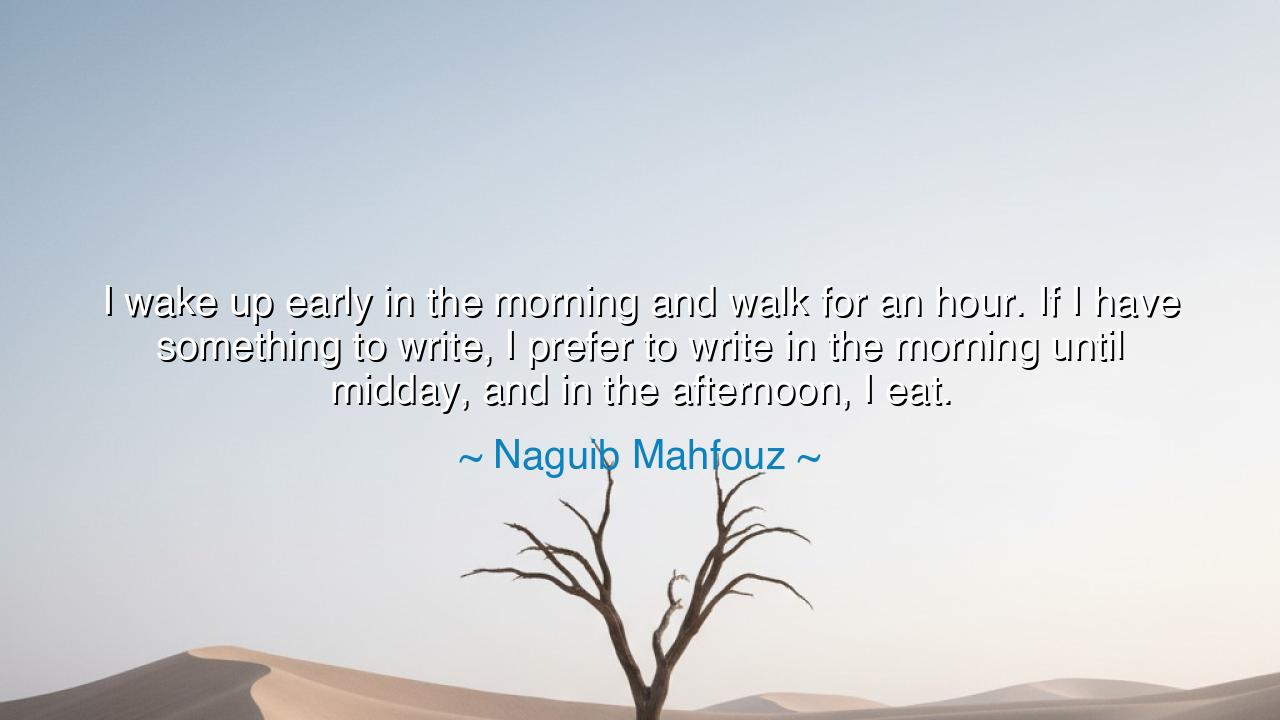
I wake up early in the morning and walk for an hour. If I have
I wake up early in the morning and walk for an hour. If I have something to write, I prefer to write in the morning until midday, and in the afternoon, I eat.






“I wake up early in the morning and walk for an hour. If I have something to write, I prefer to write in the morning until midday, and in the afternoon, I eat.” Thus speaks Naguib Mahfouz, the sage of Cairo, who carried within him the stories of nations and the silence of discipline. His words, simple as the daily rising of the sun, conceal a deeper truth: that greatness is not born in sudden storms of inspiration, but in the steady rhythm of ordered days. In his confession, we see the map of a life built upon balance—of body, mind, and spirit.
To wake up early is to align oneself with the universe. For dawn is the hour of beginnings, when shadows recede and the air is still pure. In the silence of morning, the world has not yet pressed its burdens upon us. The ancients revered this hour; the Roman statesmen rose before the cock’s crow to write letters and set affairs in order, and the sages of the East greeted the sun with prayer and meditation. Mahfouz, too, found in the morning the fertile soil of creation, a time when thought flows freely and the mind is closest to the source of clarity.
The act of walking is no idle pastime in his routine. It is the oldest meditation of humankind, the union of movement and thought. To walk is to stir the body while allowing the spirit to wander, to let ideas rise and fall with each step upon the earth. Socrates himself was known to walk through the streets of Athens, teaching as he moved, for he believed wisdom flows best when the body is in motion. In Mahfouz’s practice, the walk prepares the mind for the labor of writing, opening channels of creativity as the dawn brightens.
Then comes the sacred act of writing—not in chaos, but in order, set within the morning until midday. For Mahfouz knew that inspiration is not a fleeting muse that visits at random, but a companion that appears when summoned through discipline. He, like the monks of old who copied manuscripts by candlelight, built his life upon routine, trusting that art flows not from waiting but from working. To write daily, to sit with the pen when the world is still, is to draw water from the well of the soul.
And in the afternoon, he speaks not of endless labor but of rest, of eating, of honoring the body that carries the mind. This is wisdom: to recognize that the vessel of thought must be nourished. The ancients taught balance—the Greek ideal of sophrosyne, the harmony of life’s parts. Mahfouz embodies this truth, refusing both indulgence and neglect, and instead choosing rhythm: walk, write, eat, live. His life was not extravagant, but it was fruitful, and from it came works that carried the voices of a people across the world.
Consider also the life of Leo Tolstoy, who, though mighty in pen, ordered his days with simplicity: rising early, tending his fields, writing through the morning, resting in the afternoon. It was in this rhythm that War and Peace and Anna Karenina were born. Both Tolstoy and Mahfouz show us that genius does not bloom from chaos, but from the soil of routine, watered daily by effort and steadiness.
The lesson for us is clear: discipline is the mother of creativity. To long for greatness without structure is to chase shadows. But to order one’s days—rising early, giving the mind its sacred hours, honoring the body with movement and nourishment—is to build a life from which art, wisdom, and joy may flow.
Therefore, children of tomorrow, let this be your practice: rise with the dawn, walk so that your thoughts may awaken, labor in the morning when your strength is fresh, and rest when the sun begins to fall. Do not wait for inspiration as though it were a fickle guest; summon it with the discipline of daily practice. And remember always the teaching of Mahfouz: the greatness of a life is woven not in rare moments, but in the humble rhythm of every day.






AAdministratorAdministrator
Welcome, honored guests. Please leave a comment, we will respond soon